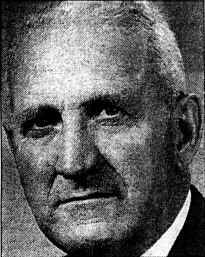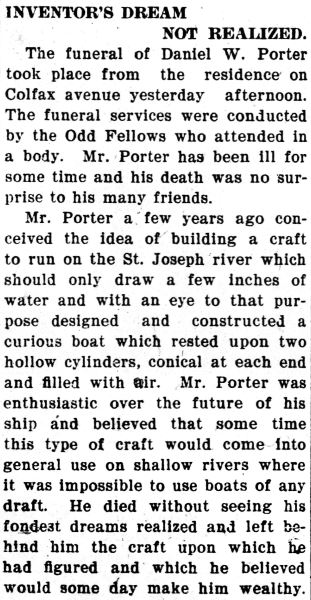 A quick Google search on who invented the first pontoon boat will pull up multiple articles on a Minnesota farmer by the name of Ambrose Weeres who, in 1952, is credited with the invention of the modern-day pontoon. But even Wikipedia and other sources freely admit Weeres wasn't, “the first to fasten logs to a platform.” Jim Couch, a Michigan researcher who focuses on local pioneer families of Berrien County, recently shared two old newspaper clippings from 1905 that would suggest Daniel W. Porter operated a “flat boat” carrying passengers up the St. Joseph River before he died at the age of 74.
A quick Google search on who invented the first pontoon boat will pull up multiple articles on a Minnesota farmer by the name of Ambrose Weeres who, in 1952, is credited with the invention of the modern-day pontoon. But even Wikipedia and other sources freely admit Weeres wasn't, “the first to fasten logs to a platform.” Jim Couch, a Michigan researcher who focuses on local pioneer families of Berrien County, recently shared two old newspaper clippings from 1905 that would suggest Daniel W. Porter operated a “flat boat” carrying passengers up the St. Joseph River before he died at the age of 74.
Following Porter's funeral in October 1905, an article titled “Inventor's Dream Not Realized” was published in the St. Joseph Daily Press. The local newspaper wrote that Porter conceived the idea of building a St. Joseph River craft which should “only draw a few inches of water and with an eye to that purpose designed and constructed a curious boat which rested upon two hollow cylinders, conical at each end and filled with air.”
Based on that description it appears Porter had constructed some type of a pontoon boat, nearly 50 years before Ambrose got started building his version. The article goes on to credit Porter for being enthusiastic over the future of his ship and said he believed that some day this type of craft would come into general use on shallow rivers where it was impossible to use boats of any draft, and he also believed his boat would some day make him wealthy.
Couch, who has no connections to the family, makes a strong case that Porter might actually be the inventor of the first pontoon boat, but when you're talking about something that took place in the early 1900s when records and documentation were scarce, it's hard to say for sure.
Again, when Weeres is credited as the inventor, it's often noted depending on the source that no one is claiming he was the first to actually build a pontoon boat. In fact, Couch also found an article from the [Daily Palladium] from 1897 on a “unique river steamer” with two pontoons with a common deck, powered by “two Kriebel upright marine engines.” Yep, it appears the first twin engine pontoon dates back to pre-1900!

Despite these other pontoon boats, I believe Weeres is recognized as the inventor because after putting a wooden platform on two columns of steel barrels welded together end-to-end, he actually marketed the boat and sold “The Empress” pontoon through dealers. The farmer ended up starting Weeres Industries to meet unexpected demand so it's easy to see why he's credited as the inventor.
A small outboard provided the power, but creating the steering system was the big challenge for Weeres. What he came up with was a vertical stick at the forward railing connected by two lines to the engine. The idea was to move the stick to the left to turn left, center the stick for straight ahead, and lean the stick right for a right turn.
Unlike the small, narrow-beam, tippy fishing boats that people were used to seeing around the lakes, Weeres’s pontoon boat was wide, stable, and with the deck that sat considerably higher on the water than a traditional craft. This made it so taking on water was no longer a concern. Without a doubt, the pontoon boat was a completely new kind of boating experience.
Weeres, later referred to as “Mr. Pontoon,” was elected to the Minnesota Marina Hall of Fame in 1991 and in 2014 he was part of our inaugural Pontoon & Deck Boat Hall of Fame class as well. Weeres is widely recognized as the inventor while Porter – and most likely others – will never get any of the spotlight.
Even though Porter hoped his idea for a “flat boat” would someday make him rich, there is no way either inventor could possibly envision just how popular these boats would become a few short decades later.
While it's becoming less and less common, there are still people who think of a pontoon boat as nothing more than just a floating barge. They don’t realize the sacrifice and dedication people of past generations have put into an industry that is now a mainstay of the boating community. Today’s pontoon boats range from quality, value-driven models to extremely high-end luxury boats and everything in between. Powered with a high-horsepower outboard(s), pulling skiers and reaching speeds well over the 60 mph mark on the open water are well within the capabilities of the modern pontoon. Unfortunately neither Weeres nor Porter were able to see this evolution of one of the most versatile crafts ever invented.

